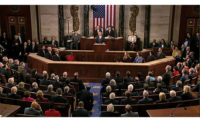In his last State of the Union address, President Obama didn’t mention “infrastructure” or “construction” but did speak about advancing renewable energy, particularly wind and solar power.
The closest Obama came in his Jan. 12 speech to discussing construction was saying he wanted to “put tens of thousands of Americans to work building a 21st-century transportation system”—which he linked to changing how the U.S. manages coal and gas resources. But Obama provided no specifics.
Obama’s latest State of the Union speech had phrases that pleased backers of renewable energy. He said that the cost of wind power is lower than “dirtier, conventional power” and talked about the benefits of solar energy.
The president also declared, “We’ve got to accelerate the transition away from old, dirtier energy sources.”
Congressional reaction to Obama’s speech came quickly and unsurprisingly split down the aisle.
For example, House Majority Leader Kevin McCarthy (R-Calif.) said in a statement, “House Republicans will continue to fight this administration’s kneejerk tendency to impose regulations or executive actions.”
House Minority Leader Nancy Pelosi (D-Calif.) praised such economic gains as a sharp cut in the unemployment rate but said, “We cannot take our foot off the gas pedal now.“ She cited a need to “confront the climate crisis,” for example.
Maybe Obama’s Jan. 12 speech was thinner on construction topics than at least some of his earlier State of the Union addresses because Congress did pass a couple of major infrastructure bills, though belatedly.
Last January 20, for example, Obama called on Congress to approve “a bipartisan infrastructure plan,” and said, “Twenty-first century businesses need 21st century infrastructure—modern ports, and stronger bridges, faster trains and the fastest Internet.”
It took until December, but Congress came through by approving the $305-billion, five-year FAST Act.
The president’s 2014 speech had substantive construction-related portions. For instance, he urged the House and Senate to pass water resources and transportation bills. Lawmakers did approve the Water Resources Reform and Development Act on June 10 of that year. Surface transportation, of course, had to wait.
He also advocated using tax changes to encourage U.S. companies “to create jobs rebuilding our roads, upgrading our ports, unclogging our commutes—because in today’s global economy, first-class jobs gravitate to first-class infrastructure.”
The idea of foreign tax “repatriation” was widely discussed during the lengthy highway-transit bill debate but ultimately wasn’t part of that legislation.
The latest news and information
#1 Source for Construction News, Data, Rankings, Analysis, and Commentary
JOIN ENR UNLIMITEDCopyright ©2024. All Rights Reserved BNP Media.
Design, CMS, Hosting & Web Development :: ePublishing



Post a comment to this article
Report Abusive Comment